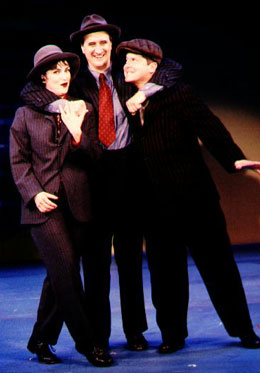
Michael McGrath, right, with Marla Schaffel and Mark Lotito In They All Laughed at the Goodspeed Opera House in 2001.
The Tony Awards did not even exist during George Gershwin’s lifetime. This year, shows he co-wrote are nominated for a combined 21 of ‘em. It’s the composer’s best showing since Crazy for You won Best Musical in 1992.
One of those shows had its rewritten revival roots in a Connecticut production in 2001.
How many Connecticut theaters have been touched by today’s newly anointed crop of Tony nominees?
On the straight play side, Jon Robin Baitz had his best-known play The Substance of Fire workshop at Long Wharf Theatre in 1990. David Ives’ popular one-act revue All in the Timing had an expanded version at the Long Wharf Theatre, which was also poised to present the East Coast premiere of Ives’ Polish Joke in 2002 until it fell apart over scheduling problems.
The Unmentionables, the play Bruce Norris wrote before his now-nominated Clybourne Park (which has already won the Pulitzer) was done at the Yale Rep in 2007.
Joe DiPietro, who created the new book for Nice Work If You Can Get It, based on the existing Gershwin musical Oh, Kay!, wrote the book & lyrics to I Love You, You’re Perfect, Now Change, which had its pre-New York try-out at the Long Wharf Theatre. DiPietro’s Over the River and Through the Woods has had successful runs at numerous small Connecticut theaters, including Seven Angels.
Nice Work If You Can Get It itself had its world premiere at the Goodspeed Opera House 11 years ago, with a different title—They All Laughed—but with the same comic actor, Michael McGrath, playing Cookie McGee. I haven’t seen the Broadway version yet, but recall howling at McGrath’s Pietro-penned expostulation “Has anyone seen my finger bandage?” at Goodspeed all those years ago.
Frank Wildhorn has frequently been produced on Broadway, but less frequently been nominated for Tonys. His best-known show, Jekyll & Hyde, had a pre-Broadway shakedown at the Shubert, and the first national tour of J&H began at the Oakdale in Wallingford. Wildhorn’s The Civil War had an old-fashioned out-of-town try-out at the Shubert pre-Broadway as well.
Douglas Carter Beane, author of Best Book of a Musical for Lysistrata Jones, had his play The Country Club at the Long Wharf during the Doug Hughes regime. I met Beane in the Long Wharf lobby, and his being amused at my being a critic who wore a button with bad-guy Reggie from the Archie comic books on my hat.
The productions may be profoundly different, but the scripts in the Best Revivals categories should all be pretty familiar to Connecticut theatergoers. Death of a Salesman had an all-African-American reworking at the Yale Rep just a few seasons ago, and Arthur Miller was of course a longtime resident of Roxbury, Connecticut. Gore Vidal’s The Best Man is a perennial of election years, and has been seen at community-based theaters such as Square One; the Broadway revival’s directed by Michael Wilson, who until this year was the artistic director of Hartford Stage. Master Class came to New Haven’s Shubert on its infamous national tour starring Faye Dunaway. Margaret Edson’s Wit may not have world-premiered at Long Wharf, but it was the Long Wharf’s East Coast premiere production (starring Kathleen Chalfant) which moved to New York and spurred the play’s Pulitzer win. On the musical side, three of the four nominated revivals—Evita, Porgy & Bess (in its original version) and Jesus Christ Superstar have all had more national tours than they’ve had Broadway revivals, and have been seen at the Bushnell, Shubert, Waterbury Palace and elsewhere.
There are nominated actors, directors and designers whose regional resumes far outstrip their New York ones. And let’s not even get started on the talent which came out of Yale, from William Ivey Long to John Lee Beatty to David Alan Grier.
Feel a little more in touch now, devoted regional theater subscribers? It’s a fact—you live on the cutting edge of American theater history.
